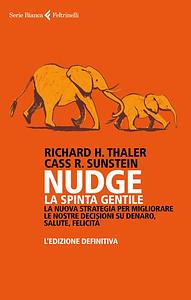Take a photo of a barcode or cover
informative
lighthearted
reflective
fast-paced
Not what i expected, or wanted. Way more global and less personal.
Daniel Kahneman + BF Skinner branded as libertarian paternalism. Good advice, but rife for exploitation. I encountered Thaler first via Charlie Munger, and it's easy to imagine how centralized authority can use the principles of nudging people, but not in their best interests.
This book details how every design we encounter- from how a cafeteria is laid out, how company insurance policies are structured, to even the presentation of terms and conditions- is “nudging” us towards making a certain decision (sometimes completely unintentionally). While some chapters are incredible (with the chapter on how to choose the right health insurance policy being exceptional), many get bogged down in unnecessary detail, example, and research.
Cass Sunstein and Richard Thaler's Nudge is really a combination of two different books. One is a very interesting analysis of why people make so many irrational, uninformed decision, and how governments and regulators can induce far better results through what the authors term "choice architecture." The second book is an excruciatingly detailed, wonky examination of how choice architecture can improve issues like prescription drug legislation, medical malpractice lawsuits, and other subjects. The first book is well-written and interesting; the second is overly academic and extremely dull (if useful).
Nudge was published 11 years ago and already feels dated — it seems designed for a highly functioning technocracy that no longer exists. In particular, the chapter on same-sex marriage goes to great lengths to preserve the "libertarian" ideal of universal civil unions, never mind that same-sex marriage is now rightfully legal everywhere in America. I don't necessarily fault the authors for failing to predict the future — even many liberals like Obama were not in favor of same-sex unions in 2007 — but it still is evident that Sunstein and Thaler write from a position of privilege.
Nudge isn't a bad book, but it feels like one that was written for a specific moment of history — not ideal for a work of popular social science that was probably intended to stand the test of time.
Nudge was published 11 years ago and already feels dated — it seems designed for a highly functioning technocracy that no longer exists. In particular, the chapter on same-sex marriage goes to great lengths to preserve the "libertarian" ideal of universal civil unions, never mind that same-sex marriage is now rightfully legal everywhere in America. I don't necessarily fault the authors for failing to predict the future — even many liberals like Obama were not in favor of same-sex unions in 2007 — but it still is evident that Sunstein and Thaler write from a position of privilege.
Nudge isn't a bad book, but it feels like one that was written for a specific moment of history — not ideal for a work of popular social science that was probably intended to stand the test of time.
The first one hundred pages of the book was really something different to me. Before reading that book, i didn't know anything about behavioral economics. The book, in fact, starts with an attempt to give reader the basic knowledge of behavioral economics. It tells common tricks that is used or can be used by producers to affect choice mechanisms of consumers by exploiting the weaknesses of human mind. These common tricks are called nudges. The term "exploiting" i used can be understood in a pejorative meaning. However, the goal of the book is not to use nudges for self-interest of profit-seeking companies, but to use them for general benefit of society, in particular for protecting individual from sometimes even himself. The last phrase can give unavoidably a sense of paternalism.
The key concept the book invented, at that time, comes into solving dilemma: "libertarian paternalism". For the believers of that concept, nudges don't burden extra costs on individuals, so they don't force them to do what the state wants. It still lets individual choose what he wants but with just a little effort that nudges require to avoid what they set up as a default.
The key concept the book invented, at that time, comes into solving dilemma: "libertarian paternalism". For the believers of that concept, nudges don't burden extra costs on individuals, so they don't force them to do what the state wants. It still lets individual choose what he wants but with just a little effort that nudges require to avoid what they set up as a default.
challenging
informative
inspiring
medium-paced
1) Perhaps if I'd read this 10 years ago, I would've found it more interesting. As it stands, now I'm a little bit more skeptical about these kinds of books and the studies they cite
2) I thought this book would be more captivating for a lay audience, but it entirely written for a policy maker lens, which I am not. Wish the marketing & discussion around this book had been more clear about who the intended audience was. Additionally, each of the chapters went on entirely too long; I end up skipping large sections because they were so repetitive.
3) Can the authors please find a thesaurus and use a word other than "salient" occasionally.
2) I thought this book would be more captivating for a lay audience, but it entirely written for a policy maker lens, which I am not. Wish the marketing & discussion around this book had been more clear about who the intended audience was. Additionally, each of the chapters went on entirely too long; I end up skipping large sections because they were so repetitive.
3) Can the authors please find a thesaurus and use a word other than "salient" occasionally.
This is a good complement to Cialdini's book on Influence, and was at times very interesting. Other times, however, it almost put me to sleep -- which is really bad because I listened to it while commuting.


